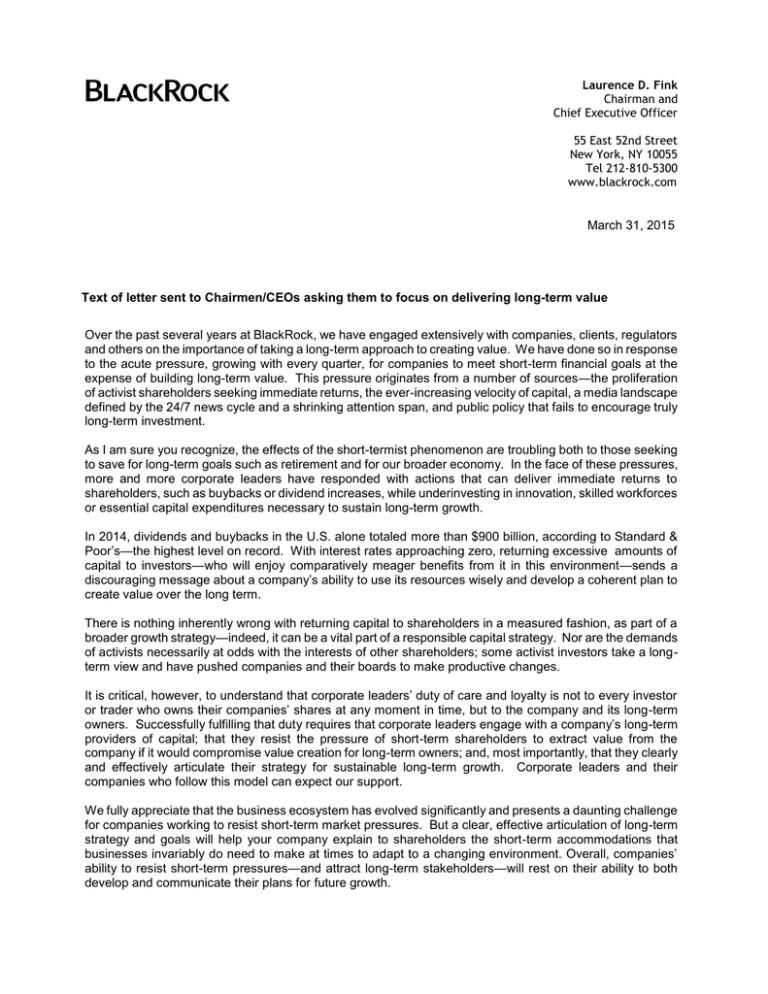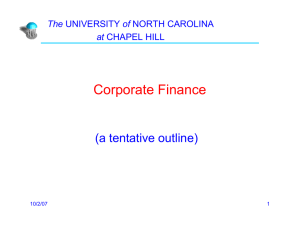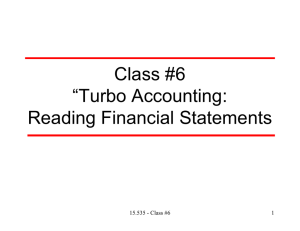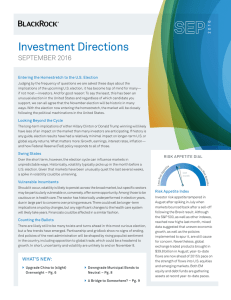March 31, 2015 Over the past several years at BlackRock, we have
advertisement

Laurence D. Fink Chairman and Chief Executive Officer 55 East 52nd Street New York, NY 10055 Tel 212-810-5300 www.blackrock.com March 31, 2015 Text of letter sent to Chairmen/CEOs asking them to focus on delivering long-term value Over the past several years at BlackRock, we have engaged extensively with companies, clients, regulators and others on the importance of taking a long-term approach to creating value. We have done so in response to the acute pressure, growing with every quarter, for companies to meet short-term financial goals at the expense of building long-term value. This pressure originates from a number of sources—the proliferation of activist shareholders seeking immediate returns, the ever-increasing velocity of capital, a media landscape defined by the 24/7 news cycle and a shrinking attention span, and public policy that fails to encourage truly long-term investment. As I am sure you recognize, the effects of the short-termist phenomenon are troubling both to those seeking to save for long-term goals such as retirement and for our broader economy. In the face of these pressures, more and more corporate leaders have responded with actions that can deliver immediate returns to shareholders, such as buybacks or dividend increases, while underinvesting in innovation, skilled workforces or essential capital expenditures necessary to sustain long-term growth. In 2014, dividends and buybacks in the U.S. alone totaled more than $900 billion, according to Standard & Poor’s—the highest level on record. With interest rates approaching zero, returning excessive amounts of capital to investors—who will enjoy comparatively meager benefits from it in this environment—sends a discouraging message about a company’s ability to use its resources wisely and develop a coherent plan to create value over the long term. There is nothing inherently wrong with returning capital to shareholders in a measured fashion, as part of a broader growth strategy—indeed, it can be a vital part of a responsible capital strategy. Nor are the demands of activists necessarily at odds with the interests of other shareholders; some activist investors take a longterm view and have pushed companies and their boards to make productive changes. It is critical, however, to understand that corporate leaders’ duty of care and loyalty is not to every investor or trader who owns their companies’ shares at any moment in time, but to the company and its long-term owners. Successfully fulfilling that duty requires that corporate leaders engage with a company’s long-term providers of capital; that they resist the pressure of short-term shareholders to extract value from the company if it would compromise value creation for long-term owners; and, most importantly, that they clearly and effectively articulate their strategy for sustainable long-term growth. Corporate leaders and their companies who follow this model can expect our support. We fully appreciate that the business ecosystem has evolved significantly and presents a daunting challenge for companies working to resist short-term market pressures. But a clear, effective articulation of long-term strategy and goals will help your company explain to shareholders the short-term accommodations that businesses invariably do need to make at times to adapt to a changing environment. Overall, companies’ ability to resist short-term pressures—and attract long-term stakeholders—will rest on their ability to both develop and communicate their plans for future growth. March 31, 2015 Page 2 Companies should not have to fight this battle alone. We believe that government leaders around the world—with a concerted push from both investors and companies—must act to address public policy that fosters long-term behavior. We believe that U.S. tax policy, as it stands, incentivizes short-term behavior. For tax purposes, the U.S. currently defines a long-term investment as one held for one year. Since when was one year considered a long-term investment? A more effective structure would be to grant long-term treatment only after three years, and then to decrease the tax rate for each year of ownership beyond that, potentially dropping to zero after 10 years. This would create a profound incentive for more long-term holdings and could be designed to be revenue neutral. In short, tax reform that promotes long-term investment will benefit both the companies who rely on capital markets and the hundreds of millions of people saving for retirement. Asset managers like BlackRock also have an important role to play, which is why we engage actively with companies on the key governance factors that in our experience support long-term, sustainable, financial performance. Chief among these is board leadership—in our view, the board is management’s first line of defense against short-term pressures. Our starting point is to support management, particularly during periods where performance has deviated from the long-term trajectory. But this is more difficult to do where management has not articulated a clear long-term vision, strategic direction and credible metrics against which to assess performance. In such cases, we will take action to ensure that the owners’ interests are effectively served. To that end, we have revised our proxy voting guidelines this year to make clear our expectations of boards and set out when we may vote against directors, such as instances where we see evidence of board entrenchment or other signs of ineffective governance. But we also believe that engagement by firms such as ours should not be overly concentrated on proxy season or around earnings reports—rather, it should be consistent and sustained, and cover issues broader and deeper than board elections or earnings per share. Throughout 2015, BlackRock will continue to focus on these issues, because we recognize that although much of the financial and business community is in agreement on the need for a more long-term atmosphere, more concrete steps must be taken to achieve it. We urge you to join us and with your fellow corporate leaders to invest in the future and thereby lay the foundation for stronger, more sustainable, and more stable economic growth. Yours sincerely, Laurence D. Fink Chairman & CEO





